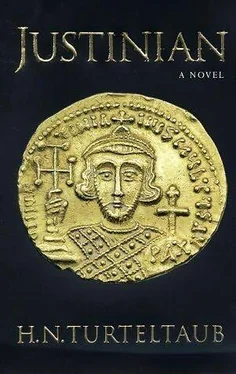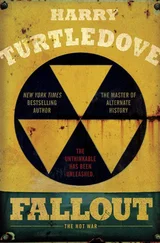Harry Turtledove - Justinian
Здесь есть возможность читать онлайн «Harry Turtledove - Justinian» весь текст электронной книги совершенно бесплатно (целиком полную версию без сокращений). В некоторых случаях можно слушать аудио, скачать через торрент в формате fb2 и присутствует краткое содержание. Жанр: Историческая проза, на английском языке. Описание произведения, (предисловие) а так же отзывы посетителей доступны на портале библиотеки ЛибКат.
- Название:Justinian
- Автор:
- Жанр:
- Год:неизвестен
- ISBN:нет данных
- Рейтинг книги:3 / 5. Голосов: 1
-
Избранное:Добавить в избранное
- Отзывы:
-
Ваша оценка:
- 60
- 1
- 2
- 3
- 4
- 5
Justinian: краткое содержание, описание и аннотация
Предлагаем к чтению аннотацию, описание, краткое содержание или предисловие (зависит от того, что написал сам автор книги «Justinian»). Если вы не нашли необходимую информацию о книге — напишите в комментариях, мы постараемся отыскать её.
Justinian — читать онлайн бесплатно полную книгу (весь текст) целиком
Ниже представлен текст книги, разбитый по страницам. Система сохранения места последней прочитанной страницы, позволяет с удобством читать онлайн бесплатно книгу «Justinian», без необходимости каждый раз заново искать на чём Вы остановились. Поставьте закладку, и сможете в любой момент перейти на страницу, на которой закончили чтение.
Интервал:
Закладка:
Even before this time, the Arabs, curse them, had done a thing the Persians never did in all their centuries of war against us Romans. They took to the sea, endangering the Roman Empire in that new fashion. Like all the line of Herakleios, Constans my grandfather was a man who believed in going straight at the foe. He assembled the Roman fleet, and met that of the Arabs off the coast of Lykia, the southwestern region of Anatolia.
Before the two fleets joined battle, my grandfather dreamt he was in Thessalonike. He told this to a man who knew how to interpret dreams, asking what it meant. And the man's face grew long, and he said, "I wish you had not dreamt this dream."
As I have said, I never met Constans, but I can imagine the fearsome glare he must have given the fellow. "Why?" he would have growled.
The man who could interpret dreams had courage, for he answered with what he saw: "Your being in Thessalonike signifies, 'Give victory to someone else,' for that is the meaning of the words. You would do far better, Emperor, not to engage the enemy tomorrow."
My grandfather went out and fought the sea battle anyhow. He-
Christ and all the saints, Brother Elpidios, that's Herakleios and those who sprang from him, right there in a sentence. They weren't always right, but they were always sure. So Justinian could see that in his grandfather, could he? Too bad he never could see it in himself.
Go on, go on, I pray you. I did say I'd break in from time to time. Go on.
– fought the sea battle, and was defeated. Indeed, he was almost killed. The Arabs boarded the imperial flagship. One brave soul there stripped the robe from his back and pretended to be him, while another helped him get across a narrow stretch of sea stained red with Roman blood to a dromon not under such fierce attack. Both those heroes died, but Constans came back safe to Constantinople.
The Arabs might have moved against the Queen of Cities then, but they fell into civil strife. In the fourth year of my father's reign, though, the deniers of Christ readied a great expedition, and in the spring of his fifth year they came.
We Romans had not been idle. My father, learning of the Arabs' preparations, ordered our shipwrights to work straight through the winter, building and refurbishing the vessels upon which, along with the great walls of Constantinople, our safety depended. On learning the foe's fleet had set out from Kilikia, where it had wintered, and was bound for the imperial city, he and his brothers- the two junior Emperors, Herakleios and Tiberius (my uncles, in other words)- decided to hearten the workmen and sailors at the Proklianesian harbor, and they took me with them.
When I think back on it, I am astonished by how much I remember of the day: the sights, the sounds, most of all the smells of fresh-cut wood and rope and pitch. Perhaps I should not be surprised. Till then, I had spent most of my time with my mother, the Empress Anastasia, and with the women of the palace. Now I was decked out in miniature robes of deep crimson- for I was a prince myself- and borne along in a sedan chair right behind those my father and my uncles rode. I kept peeking out through the curtains to see as much of the city as I could.
The Proklianesian harbor lies on the southern side of Constantinople, just east of the harbor of Theodosios, the largest of the city's anchorages. It is not a harbor for merchantmen or fishing boats: war galleys lie there.
I had never seen dromons before. They were long and lean, some with one bank of oars, some with two. The bronze rams they carried at the bow were green and pitted from the sea; some had gray or purple-red patches of barnacles growing on them. The dromons carried wooden towers amidships, from which archers could shoot down at the decks of enemy vessels. Each had sockets for masts before and behind the tower, but the masts were not in place now.
I had never seen or heard such men as those who worked on the dromons and would presently sail them either. The sun had burnt them near as black as Ethiopians are said to be, and sun and wind and spray carved harsh lines in their faces. Some of them wore wool or linen tunics that did not reach their knees, others just a cloth wrapped around their loins, commonly with a sheathed knife on the right side.
When they saw me, they smiled and pointed and called to me. I remember how white their teeth were against beards and dark faces. I also remember how much trouble I had understanding their Greek. Compared to what I heard in the palaces, it was clipped and quick, hardly seeming the same language at all.
My father and uncles had no trouble with it. In fact, when they talked with the sailors, they dropped into it themselves. I had never heard them speak like that before. Now, of course, I too talk like an educated man among clerics and accountants, and like a sailor among sailors.
A party of workmen came up the docks, past me, my father, and my uncles. Some of them were carrying bronze tubes, not sea-green like the dromons' rams but bright and shiny, the color of a freshly minted forty-follis coin. Others bore contraptions of hide and wood. After a moment, I recognized them as bellows, oversized cousins to the ones the cooks in the kitchens used to make their fires burn hotter. I pointed to them. "What are those for? Will the sailors blow on the sails with them to make the ships go faster?"
My father, my uncles, and everyone else who heard me laughed. I knew then I was wrong. That made me angry. I stamped my foot and screamed as if I were being made a eunuch.
My uncle Tiberius turned to Herakleios and murmured, "Constantine should clout him when he acts like that." Herakleios nodded. My father did not notice the byplay. Even though I was screaming, I did. I screamed even louder, just to annoy my uncles the more.
My uncle called to a swarthy, hawk-faced man who walked along behind the workers with the tubes and the bellows: "Attend us, Kallinikos!"
The swarthy man approached and bowed very low, first to my father, then to each of my uncles in turn, and last of all to me. I was surprised enough to quiet down. "How may I serve you, Emperor?" Kallinikos asked. He was an educated man; I could tell that at once. Yet his Greek had a guttural undertone I had not heard before. Since the Arabs burst out of the desert, Syrian accents have grown scarce in Constantinople.
"Tell the prince Justinian," my father said, pointing to me, "why these men are fitting our ships with the devices you have invented."
"Of course, Emperor." Kallinikos bowed first to my father and then to me. He did not bow again to my uncles. I liked that. To me, he said, "Prince, these tubes will project out across the water and onto any ship that comes close to one of ours a liquid fire that will cling and burn it up."
"How is it made?" I asked.
Kallinikos started to answer, then hesitated, looking to my father, who said, "We should not speak of that here on the docks, where so many men can listen. The making of this liquid fire is a secret, and we do not want the Arabs to learn how it is done. Do you understand?"
He spoke gravely. I nodded. As he had intended, he had taught me a lesson: that secrecy could matter not only to a boy but to an Emperor. I have remembered.
My father went on, "Kallinikos here, being a good Christian man"- he made the sign of the cross, as did my uncles, as did I, as did Kallinikos himself-"came here to the Queen of Cities from Heliopolis with his invention, not wanting it to fall into the hands of the followers of the false prophet." All at once he looked quite grim. "And soon we shall see just how much use it is to us, too."
Two years before, the Arabs had captured Smyrna, on the western coast of Anatolia, and Kyzikos, which lies under Mount Dindymos across the Propontis from Constantinople, to serve as bases for their assault on the Queen of Cities. When full spring brought good weather and reduced the chance of storms on the narrow sea between Kyzikos and Constantinople, the deniers of Christ sailed up and laid siege to our God-guarded imperial capital.
Читать дальшеИнтервал:
Закладка:
Похожие книги на «Justinian»
Представляем Вашему вниманию похожие книги на «Justinian» списком для выбора. Мы отобрали схожую по названию и смыслу литературу в надежде предоставить читателям больше вариантов отыскать новые, интересные, ещё непрочитанные произведения.
Обсуждение, отзывы о книге «Justinian» и просто собственные мнения читателей. Оставьте ваши комментарии, напишите, что Вы думаете о произведении, его смысле или главных героях. Укажите что конкретно понравилось, а что нет, и почему Вы так считаете.












